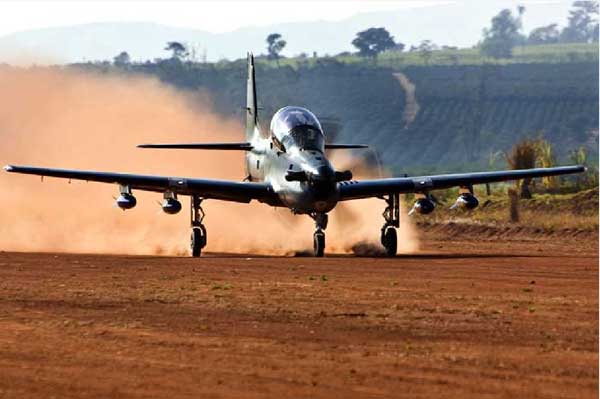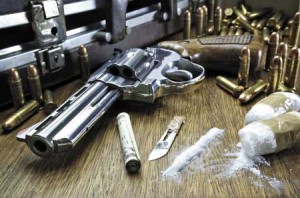Criminalized States and Terrorist-Criminal Pipelines
By Douglas Farah
The FARC, Venezuela and Iran
07/26/2011 – While the transnational trafficking and financial operations of the Sinaloa cartel are important, the FARC alliances and actions offer an important look at the use of non-state criminal/terrorist armed groups by a criminalized state.
 The Super Tucano FARC Killer Landing in Difficult Terrain (Credit: https://www.sldinfo.com/?p=11834)
The Super Tucano FARC Killer Landing in Difficult Terrain (Credit: https://www.sldinfo.com/?p=11834)
The well documented links of Venezuela’s “Bolivarian Revolution,” led by President Hugo Chávez, to both Iran and to the FARC—as well as the criminalization of the Venezuelan state under Chávez—point to the evolution of the model described above where a criminalized state franchises out part of its criminal enterprises to non-state actors.[1]
More worrisome from the U.S. perspective is the growing evidence of Chávez’s direct support for Hezbollah, along with his ties to the FARC.
These indicators include the June 18, 2008 designations by the U.S. Treasury Department’s Office of Foreign Assets Control (OFAC) of two Venezuelan citizens, including a senior diplomat, as terrorist supporters for working with the FARC Several businesses also were sanctioned. Among the things the two are alleged to have been conducting on behalf of Hezbollah were coordinating possible terrorist attacks and building Hezbollah-sponsored community centers in Venezuela.[2]
OFAC has also designated numerous senior Venezuelan officials, including the heads of two national intelligence services, as terrorist supporters for direct support of the FARC in the acquisition of weapons and drug trafficking.[3]
The Chávez model of allying with both state sponsors of terrorism such as Iran while sponsoring violent non-state terrorist organizations involved in criminal activities and terrorism strongly resembles the template pioneered by Hezbollah, a radical Shite Muslim terrorist organization that enjoys the state sponsorship of Iran and Syria. In fact, the military doctrine of the “Bolivarian Revolution,” officially adopted in Venezuela and rapidly spreading to Chávez’s allies in Bolivia and Nicaragua, explicitly embraces the radical Islamist model of asymmetrical or “fourth generation warfare,” and its heavy reliance on suicide bombings and different types of terrorism, including the use of nuclear weapons. This is occurring at a time when Hezbollah’s presence in Latin America is growing and becoming more identifiable.[4]

The main book Chávez has adopted as his military doctrine is Peripheral Warfare and Revolutionary Islam: Origins, Rules and Ethics of Asymmetrical Warfare (Guerra Periférica y el Islam Revolucionario: Orígenes, Reglas y Ética de la Guerra Asimétrica ) by the Spanish politician and ideologue Jorge Verstrynge.[5] Although he is not a Muslim and the book was not written directly in relation to the Venezuelan experience, Verstrynge’s book lauds radical Islam (as well as past terrorists like Ilich Ramírez Sánchez, better known as Carlos the Jackal)[6] for helping to expand the parameters of what irregular warfare should encompass, including the use of biological and nuclear weapons, along with the correlated civilian casualties among the enemy. Chávez has openly admitted his admiration for Ramírez Sánchez, who is serving a life sentence in France for murder and terrorist acts.[7]
Central to Verstrynge’s idealized view of terrorists is his regard for the willingness of the fighters to sacrifice their lives in pursuit of their goals as sacred. Before writing extensively on how to make chemical weapons and listing helpful places to find information on the manufacture of rudimentary nuclear bombs that “someone with a high school education could make,” Verstrynge writes:
We already know it is incorrect to limit asymmetrical warfare to guerrilla warfare, although it is important. However, it is not a mistake to also use things that are classified as terrorism and use them in asymmetrical warfare. And we have super terrorism, divided into chemical terrorism, bioterrorism (which uses biological and bacteriological methods), and nuclear terrorism, which means “the type of terrorism uses the threat of nuclear attack to achieve its goals.”[8]
In a December 12, 2008 interview with Venezuelan state television, Verstrynge lauded Osama bin Laden and al Qaeda for creating a new type of warfare that is “de-territorialized, de-stateized and de-nationalized,” a war where suicide bombers act as “atomic bombs for the poor.”[9]
Chávez liked the book so well he had a special pocket-sized edition printed and distributed to the officer corps with express orders that it be read cover to cover.
While there is only anecdotal evidence to date of the merging of the Bolivarian Revolution’s criminal-terrorist pipeline and the criminal-terrorist pipeline of radical Islamist groups (Hezbollah in particular) supported by the Iranian regime, the possibility opens a series of new security challenges for the United States and its allies in Latin America.
What is clear is that Iran has greatly increased its diplomatic, economic and intelligence presence in Latin America, an area where it has virtually no trade, no historic or cultural ties and no obvious strategic interests. The sole points of convergence of the radical and reactionary theocratic Iranian government and the self-proclaimed socialist and progressive Bolivarian revolution are: 1) an overt and often stated hatred for the United States and 2) a shared view of an authoritarian state that tolerates little dissent and encroaches on all aspects of a citizen’s life.[10]
Such a relationship between non-state and state actors provides numerous benefits to both. In Latin America, for example, the FARC gains access to Venezuelan territory without fear of reprisals, gains access to Venezuelan identification documents, and, perhaps most importantly, gains access to routes for exporting cocaine to Europe and the United States while using the same routes to import quantities of sophisticated weapons and communications equipment. In return, the Chávez government can keep up military pressure on its most vocal opponent in the region, the Colombian government, a staunch U.S. ally that has been the recipient of significant amounts of military and humanitarian aid from the United States.
In addition, Chávez maintains his revolutionary credentials in the radical axis comprised of leftist populists and Islamic fundamentalists, primarily Iran. Perhaps equally important, his government is able to profit from the transit of cocaine and weapons through the national territory at a time when oil revenues are low and the budget is under significant stress.
[1] For a closer examination of the relationship of the FARC to the Venezuelan government for support in drug trafficking activities, training and political support see the four-part series by the author, based on field work in Colombia and access to a portion of the FARC documents acquired by the Colombian military following the March 1, 2008 attack on La Angostura in Ecuador, where the FARC’s deputy commander Raúl Reyes was killed:
http://www.nefafoundation.org/miscellaneous/FeaturedDocs/nefafarc0408.pdf
http://www.nefafoundation.org/miscellaneous/nefafarc0708.pdf
http://www.nefafoundation.org/miscellaneous/FeaturedDocs/nefafarcirnetworkdeception0908.pdf
http://www.nefafoundation.org/miscellaneous/FeaturedDocs/nefafarclessonslearned1108.pdf
For a further examination of Iran’s ties to the Bolivarian states, see: Douglas Farah, “Iran in Latin America: An Overview,” Iran in Latin America: Threat or Axis of Annoyance,” Woodrow Wilson International Center for Scholars, Cynthia J. Arnson et al, editors, June 2009, accessed January 21, 2011, at: http://www.douglasfarah.com/pdfs/20090620_DFIraninLatAmJune2009-1.pdf
[2] One of those designated, Ghazi Nasr al Din, served as the charge d’affaires of Venezuelan embassy in Damascus, and then served in the Venezuelan embassy in London. The OFAC statement said that in late January 2006, al Din facilitated the travel of two Hezbollah representatives of the Lebanese parliament to solicit donation and announce the opening of a Hezbollah-sponsored community center and office in Venezuela. The second individual, Fawzi Kan’an is described as a Venezuela-based Hezbollah supporter and a “significant provider of financial support to Hizbollah.” He met with senior Hezbollah officials in Lebanon to discuss operational issues, including possible kidnapping and terrorist attacks. The OFAC statement can be accessed at: http://www.treas.gov/press/releases/hp1036.htm
[3] Among those designated were Hugo Armando Carvajal, director of Venezuela’s Military Intelligence Directorate for his “assistance to the FARC, (including) protecting drug shipments from seizure”; Henry de Jesus Rangel Silva, director of Venezuela’s Directorate of Intelligence and Prevention Services for “materially assisting the narcotics activities of the FARC”; and Ramón Emilio Rodriguez Chacín, at the time Venezuela’s minister of interior and justice, described as “the Venezuelan government’s main weapons contact for the FARC.” See the full designation at: http://treas.tpaq.treasury.gov/press/releases/hp1132.htm
[4] In addition to Operation Titan, there have been numerous incidents in the past 18 months of operatives being directly linked to Hezbollah who have been identified or arrested in Venezuela, Colombia, Guatemala, Aruba and elsewhere in Latin America.
[5] Verstrynge, born in Morocco to Belgian and Spanish parents, began his political career on the far right of the Spanish political spectrum as a disciple of Manuel Fraga, and served as a national and several senior party posts with the Alianza Popular. By his own admission he then migrated to the Socialist Party, but never rose through the ranks. He is widely associated with radical anti-globalization views and anti-U.S. rhetoric, repeatedly stating that the United States is creating a new global empire and must be defeated. Although he has no military training or experience, he has written extensively on asymmetrical warfare.
[6] It is worth noting that Chávez wrote to Ramírez Sánchez in 1999, expressing his admiration for the terrorist, signing off, “with profound faith in the cause and in the mission — now and forever.” The letter set of in international furor. See: “Troops Get Provocative Book,” Miami Herald, Nov. 11, 2005.
[7] Ian James, “Chavez Praises Carlos the Jackal,” Associated Press, November 21, 2009, accessed January 24, 2011, at: http://www.independent.co.uk/news/world/americas/chavez-praises-carlos-the-jackal-1825135.html
[8] Verstrynge, op cit., pp. 56-57.
[9] Bartolomé, op cit. See also: John Sweeny, “Jorge Verstrynge: The Guru of Bolivarian Asymmetric Warfare,” www.vcrisis.com, Sept. 9, 2005; and “Troops Get Provocative Book,” Miami Herald, Nov. 11, 2005.
[10] Farah, “Iran in Latin America: An Overview,” op cit.

